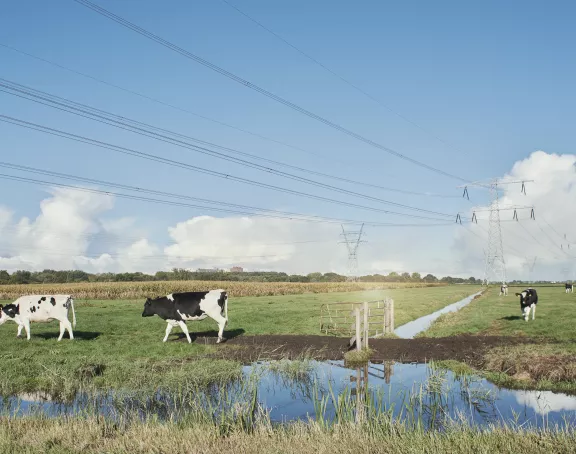Grid congestion in the Netherlands: ACM consultation of new prioritisation framework for electricity transport capacity requests
The Dutch energy regulator the Authority for Consumers and Markets (ACM) published for consultation a new prioritisation framework for electricity transport capacity requests (draft decision of 26 June 2025).
The ACM has retained the three main priority categories which are included in the current prioritisation framework: (1) congestion relievers, (2) public safety and (3) basic necessities. New parties and activities are included in categories 2 and 3. The ACM has provided a new explanatory memorandum. Market parties are invited to submit their views no later than 7 August 2025.
This blog discusses the background, substantiation and consultation of the new draft prioritisation framework.
Grid congestion
In many parts of the Netherlands grid operators are experiencing or expecting a structural shortage of transport capacity on their electricity grids. Multiple actions are being undertaken and considered by the relevant ministers, grid operators and the ACM to try to improve the situation.
One of such actions is the introduction of a prioritisation framework for electricity transport capacity requests, which entered into force as from 1 October 2024 (decision of 12 April 2024). In respect of parts of the electricity grid which are not congested, the ‘first come, first serve’ (FCFS) principle applies to requests for electricity transport capacity. The prioritisation framework obliges grid operators to provide priority to the transport capacity requests of certain parties in congestion areas.
Based on the current prioritisation framework, if priority is requested and granted, grid operators should apply priority in the following order: (i) requests of 'congestion relievers', (ii) requests relating to public safety and (iii) requests relating to basic necessities. To transport capacity requests within these categories, the FCFS principle is applied.
Annulment of the prioritisation framework
On 11 March 2025, the Trade and Industry Appeals Tribunal (College van Beroep voor het bedrijfsleven) (CBb) overturned the ACM’s decision of 12 April 2024. The CBb ruled that the ACM’s substantiation of the prioritisation categories was too limited (ECLI:NL:CBB:2025:145). The ACM solely referred to the Gas Supply Security Regulation (Verordening Gasleveringszekerheid) (Regulation (EU) 2017/1938) as the basis for the decision to include the three prioritisation categories and subcategories.
According to the CBb, the ACM should have made an independent assessment of the interests involved, such as the parties’ obligation to become more sustainable and to perform essential functions for society. The CBb decided that the prioritisation framework shall remain in force until 1 January 2026 to provide the ACM with sufficient time to decide on a new prioritisation framework.
New substantiation
In the process of preparing the renewed prioritisation framework, the ACM consulted amongst other with the Minister of Climate and Green Growth (Minister van Klimaat en Groene Groei), the European Commission and the grid operators. In addition to the Gas Supply Security Regulation, the ACM now also refers to amongst other the Gas Protection and Restoration Plan 2023 (Bescherm- en herstelplan gas 2023), the CER Directive (Directive (EU) 2022/2557) and various national security laws.
Main categories retained - new subcategories included
The ACM has retained the three priority categories. The first category, congestion relievers, concern parties of which the grid operator determines that the allocation of transport capacity to that party will result in an increase of the available transport capacity for other parties and will not lead to an increase in congestion of the grid managed by other grid operators.
For determining which activities should be included within category 2 and 3 of the new prioritisation framework, the ACM states that it has applied the following three cumulative assessment criteria:
- not awarding new or additional transport capacity (a) leads to serious damage to national security, (b) causes severe damage to the provision of public services at national or regional level or (c) would lead to a severe disruption of society;
- the activity must be carried out in the Netherlands to serves a significant public interest in the Netherlands; and
- there is no reasonable alternative available within the European Union, such as an alternative location or provider.
In the explanatory memorandum, the ACM assesses 24 activities based on these criteria, including energy (electricity, gas, oil, heat and hydrogen) production, supply, trade and storage, the financial sector, datacenters, waste management companies and telecom services.
On the basis of its assessment, the ACM has included new subcategories in prioritisation categories 2 and 3. For example, the ACM has included in category 2 (safety) sub categories relating to telecom to the extent used for safety services, electricity grids, the developers and suppliers of highly sensitive technologies and air, water, rail and road traffic safety. An example of a new activity included in category 3 (basic necessities) is public transport.
In addition, in the explanatory memorandum the ACM among others provides further explanation and substantiation of certain other aspects.
Parties contributing to environmental and climate goals
In its decision of 12 April 2024 introducing the prioritisation framework, the ACM noted that parties contributing to environmental and climate goals are difficult to define and would not be included in the framework at that time. In the explanatory memorandum to the document published for consultation today, the ACM notes that it does not have sufficient time available to carefully design and implement a fourth category relating to such parties in this framework which should apply as from 1 January 2026. The ACM states that it will assess if it can clearly and precisely define such category prior to the evaluation of the prioritisation framework (planned for 1 October 2026).
Consultation
In view of the consultation, the ACM asks market parties to provide their views in general and in respect of three specific questions, each of which contain a number of sub-questions which are not fully set forth below.
According to the current and proposed prioritisation framework, if multiple parties qualify for priority in a certain category the FCFS principle applies to such requests within each category.
As part of the first question, the ACM asks if the prioritisation framework should contain a ground for exemption (hardheidsclausule) from the application of the FCFS principle to requests which qualify for priority in accordance with category 2. The ACM asks the same question in respect of category 3. Further sub-questions relate among others to who should decide on such exemption and the requirements applicable to such exemption.
In addition, the ACM notes that the situation could arise that a party which is not included in the prioritisation framework should be provided priority compared to a party which has been granted priority in accordance with category 2 or 3. The explanatory memorandum states that in such case the ACM will apply the three criteria referred to above (under 'Main categories retained - new subcategories included') and, if necessary, amend the prioritisation framework to include such activity or party.
The ACM asks if the framework provides sufficient flexibility to be able to react to the dynamic issues relating to grid congestion. If not, the ACM asks how this could be improved.
The second question of the ACM relates to the possibility to allow grid operators to deviate from the application of the FCFS principle within the category of congestion relievers, for example if certain parties would resolve congestion in respect of a particular substation of the grid operator. If so, the ACM asks if the grid operators would be responsible for determining the order based on transparent and objective criteria, or if this should be another party.
The third question concerns if telecom and other public grids in the general sense should be included in the prioritisation framework. The ACM notes that it finds it difficult to justify the inclusion of telecom and such public grids, among others because they are used for purposes such as gaming or watching movies and tv-programmes.
The ACM invites market parties to submit their views no later than 7 August 2025. The ACM plans to publish the final code amendment decision at latest in December 2025, to allow grid operators to apply the new prioritisation framework as from 1 January 2026. Submitting a view is one of the requirements to be able to appeal to the final code amendment decision in court.


